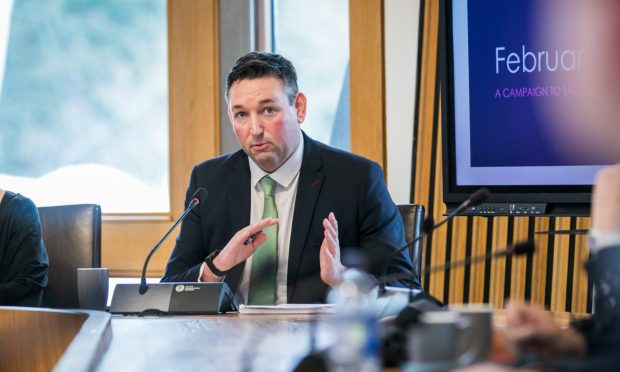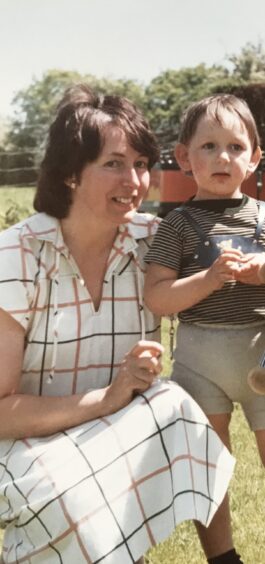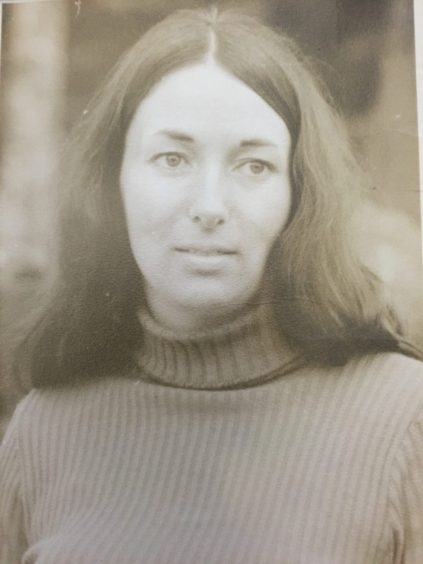
After losing his mum Joan to breast cancer when he was just seven years old, and seeing the care she received in a hospice, MSP Miles Briggs is determined to ensure we have a legal right to care from the cradle to the grave.
He said: “As a child, by the time I was old enough to understand, I grew up knowing that Mum was not well.
“My dad was a farmer and I had two older sisters who knew more than I did about Mum being unwell.
“I can only imagine how hard it must have been for everyone trying to keep going and making things as ‘normal’ as possible.”
Briggs and his family were living near Preston, Lancashire, and the devastating blow of terminal cancer for his mum, at just 44, was unbelievably cruel.
Going from enjoying an idyllic life in the countryside to losing his mum when he was barely able to understand was made more bearable by the care and support from the hospice team.
He said: “Being a farmer, life does not stop, so it must have been very difficult for my father to keep going and caring for all of us when Mum was so very ill.
“At the end, Mum was able to go into a hospice and I vividly remember us all being surrounded by care and love. It seemed so peaceful.
“The day Mum died, I went to see her, and I remember being encouraged to go to school as normal because there was a special sports event on.
“When I returned to the hospice, I was taken out into their beautiful gardens and was told that Mum had gone.
“I cannot remember what they told me, but I do remember being cared for and feeling safe at a time when everything was so uncertain.
“I don’t think we could have had better care, both for my mum and for my family.
“That is why I want to see that same level of care being made available to all who want it and need it, here in Scotland.”
‘People don’t realise hospice care is not guaranteed’
Soon after his mother died, Briggs’ father brought his family to Perthshire, where he set up work in the forestry industry.
As Scottish Conservative shadow minister for social justice, Briggs says he hears constantly from families who have been unable to access hospice care, while shocking figures show one in four of us does not receive the end-of-life care we need or want.
Government funding accounts for about a third of hospice income – the rest is made through charity donations. And, last year, they faced deficits of around £16 million.
Briggs said: “People don’t realise that hospice care is not guaranteed. It’s not until you need it that you find that there are not enough places for everyone. People also don’t realise that hospice care is not fully funded by the government.
“In fact, there are concerns that, by 2040, there will be 10,000 more deaths placing an overwhelming burden on hospices at a time when they are already really struggling.
“Not only has the cost-of-living crisis badly affected hospices, the rise in wages for NHS staff has meant they struggle to find and keep staff.
“It’s time a new funding process was developed.”
The right to care is backed by Scottish Parliament’s Convener of the Cross-Party Group on Palliative Care Bob Doris and Labour’s Rhoda Grant MSP.
Doris said: “While there is a duty in Scotland for Integrated Joint Boards to deliver palliative care, technically receiving palliative care is not an explicit right. This Bill is one way that right could be made explicit.
“I welcome that the Scottish Government is keen to take a human rights-based approach to public policy.
“Making the right to palliative care explicit could be a powerful public policy driver to ensuring that our health and social care sector respond to the clear pressure that is increasingly being put on palliative care services as demand continues to steadily grow.”
Grant said: “This timely Bill addresses a growing problem in Scotland. Palliative care is something that we will all receive, or experience, either directly or indirectly, at some point in our lives, so it is essential that the universal right to receive it is enshrined into law.
“Inadequate access to palliative care can happen for a range of reasons and the results can be devastating.
“Without quality palliative care, those experiencing terminal illnesses, and those supporting them, are likely to face isolation, loneliness, discomfort, distress and poor mental health – there is simply too much at stake to get this wrong.”
Palliative care needs
The end-of-life charity Marie Curie provides care and support to the terminally ill and their families in the comfort of their own homes and also in two Scottish hospices.
They want people to be able to plan and discuss their care wishes and changes are made so everyone has the best possible end-of-life experience reflecting what is most important to them.
They say there is “significant unmet palliative care” and that a large proportion of people die without some, or all, of the palliative support they need, despite the fact 90% of people who die in Scotland each year would benefit from it.
Amy Dalrymple, Marie Curie’s Associate Director for Policy and Public Affairs in Scotland, said: “Even now, a majority of patients in Scotland’s hospitals at any given time are in the last couple of years of their lives.
“Yet many of these people are struggling to access the support they need that could provide them and their families with dignity and comfort as they die – and, if planned and delivered well, could see many people avoid being admitted to hospital.
“A right to palliative care would mean everyone would have their needs assessed.
“The bodies that deliver and fund health and care – Scotland’s Health Boards and Health and Social Care Partnerships – would have a responsibility to meet the identified need.
“And the Scottish Government would have a clear responsibility for making sure these obligations were fulfilled and this right upheld.”
Briggs has launched the Palliative Care Bill, which calls for hospice care or specialist care at home to be a legal right, with the public asked to provide their experiences.
A petition is also available for the public to support the move.
Dalrymple said: “We’re campaigning for a right to palliative care to provide a clear legal underpinning for the principle that as a society, the care we provide to people who are dying is as important as the care we provide to those being born, and throughout their lives.
“That should not depend on age, where you live, your income, housing situation, diagnosis or anything else. Marie Curie believes everyone should have the best possible experience of end-of-life and would urge all Scots to back our call for a right to palliative care.”
To sign the petition, visit https://campaigns.mariecurie.org.uk/page/144288/petition/1
To read more about the consultation go to parliament.scot/palliative-care-bill

Enjoy the convenience of having The Sunday Post delivered as a digital ePaper straight to your smartphone, tablet or computer.
Subscribe for only £5.49 a month and enjoy all the benefits of the printed paper as a digital replica.
Subscribe
 © Supplied
© Supplied